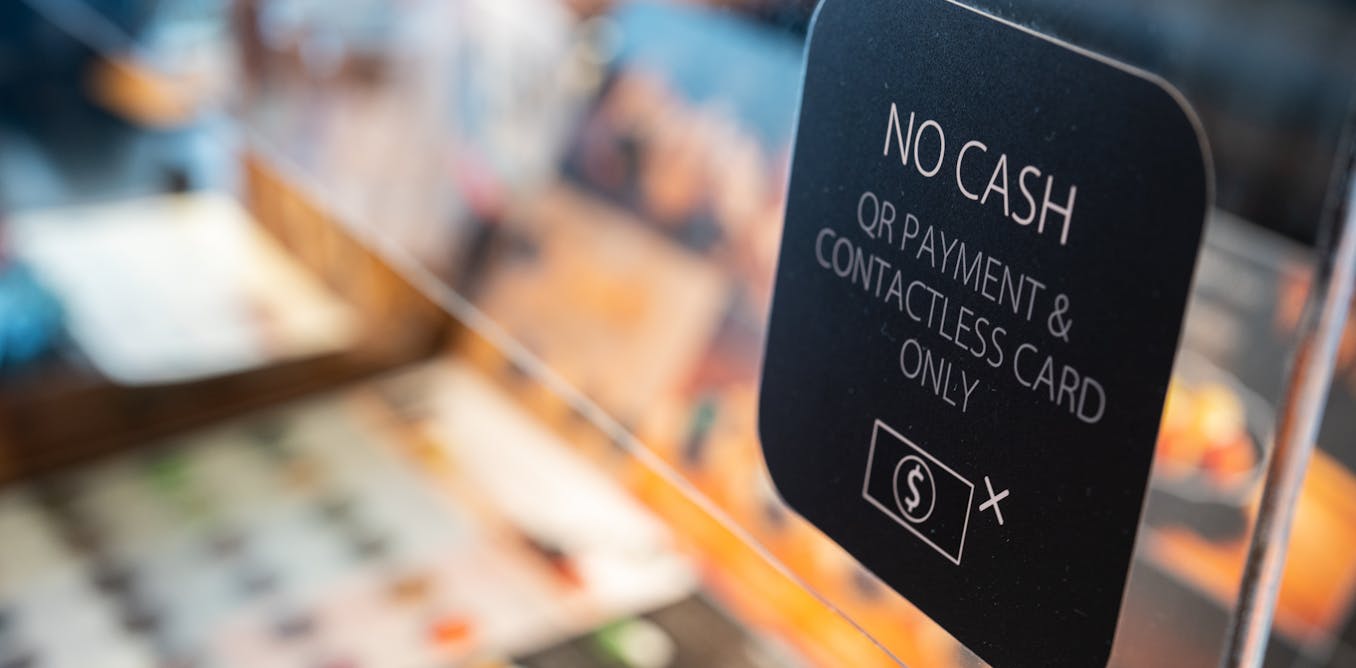- Messages
- 11,706
- Reaction score
- 2,561
- Points
- 238

‘No cash accepted’ signs are bad news for millions of unbanked Americans
A cashless economy is a less inclusive economy.
 theconversation.com
theconversation.com
Welcome to the PMBug forums - a watering hole for folks interested in gold, silver, precious metals, sound money, investing, market and economic news, central bank monetary policies, politics and more. You can visit the forum page to see the list of forum nodes (categories/rooms) for topics.
Why not register an account and join the discussions? When you register an account and log in, you may enjoy additional benefits including no ads, market data/charts, access to trade/barter with the community and much more. Registering an account is free - you have nothing to lose!

 theconversation.com
theconversation.com
I have never heard of a single case. Do you have a link?People have gone to jail here for not accepting cash as payment.
Government actions against citizens are not public record in Australia?By here, I mean Australia Mr Jerky. Criminal cases are very rarely published here.
Government actions against citizens are not public record in Australia?
Federal MP Bob Katter fired up the headline writers this week after a café in Canberra's Parliament House would not accept his $50 note as payment for lunch.
The north Queensland independent, and one of parliament's oldest politicians, clapped back at what he called "another example of a cashless society that gives all the power to the banks and strips you of your freedom".
...
- The use of digital payment methods continues to increase, particularly for small amounts. In tandem, cash withdrawals and the number of small-denomination banknotes in circulation have declined.
Fast payments reached new heights and are a prominent driver of the digitalisation of countries' payment ecosystems.

...
Due to the continued rise in digital payments, the volume of cashless payments increased markedly in 2022. The average yearly number of cashless payments per capita grew from 426 to 468 (+10%) for advanced economies (AEs) and from 246 to 291 (+18%) in emerging market and developing economies (EMDEs) (Graph 1.A). Except for in Argentina, payment cards were the most used payment instruments, followed by credit transfers. Cheque payments continued to decrease almost everywhere. On average, users in AEs made five cheque payments per person in 2022 (down from six in 2021). In EMDEs, where the use of cheques was already limited, the average fell to less than one. Overall, consumers and businesses in AEs made on average twice as many cashless transactions than those in EMDEs.
On average, the value of cashless payments as a percentage of nominal gross domestic product (GDP) increased by 4% in AEs and decreased by 2% in EMDEs (Graph 1.B). In both groups of economies, credit transfers continued to account for most of the payment value. While the value of e-money payments made up only a small share of the total, it grew most strongly, both in AEs (+15%) and EMDEs (+22%).
...
THE Bangko Sentral ng Pilipinas (BSP) said P510 million worth of coins have been deposited through its coin deposit machines (CoDMs).
The BSP said the amount is equivalent to 145.5 million pieces of coins from over 134,000 transactions.
...
Since June 2023, the BSP has installed 25 CoDMs in the Greater Manila Area.
CoDMs allow customers to conveniently deposit their legal tender coins to be credited to their GCash or Maya electronic wallet accounts, or converted into shopping vouchers.
...
In cooperation with partner retailers and electronic money issuers, the CoDMs also promote a cash-lite economy with the adoption of payments digitalization.
...

Oz is a penal colony so they probably wouldn't advertise...?Government actions against citizens are not public record in Australia?
Since the coins are just tokens of marginal value...pot-metal fiat...I don't know how much of a difference that makes.https://www.msn.com/en-ph/news/money/over-145-million-coins-deposited-via-codms/ar-BB1iOOXW
They got "coinstar" machines sucking coins out of the economy in favor of digital money.
Phone outages:This one is a drumbeat for keeping cash.
ALERT! MASSIVE Cell Outage!! Why Gold, Silver & CASH Are SO Important
Feb 22, 2024
10:21
The idiots will complain, "but what about convenience?"Cash: use it or lose it!
Aussies withdrew cash from an ATM 30,235,600 times in January (in seasonally adjusted terms), the greatest frequency since October 2022.
The total value of cash withdrawn was about $9.2 billion, which is the highest since July 2020, and the average amount withdrawn was $304.90, the highest since the reporting series began in March 2008.
This is in spite of the trend away from physical banks, with 11% of branches across Australia closing over the year to June 2023 according to APRA.
More than 164,000 Australians have now signed a petition from Cash Welcome calling for guarantees for "reasonable local access" to cash and banking services, and spokesperson Jason Bryce says this latest RBA data is proof that a cashless future is not what Aussies want.
"The increasing number of cash withdrawals is being made at a decreasing number of bank-owned ATMS, contradicting the commonly repeated bank claim that branches and ATM closures are caused by changing consumer demands," he said.
...

The National Park Service has been sued over its policy of accepting only payment of credit cards or debit cards for entry fees and refusing to take cash, a policy the agency that manages national parks, national monuments and other sites adopted last year.
Three park visitors, Esther van der Werf of Ojai, Toby Stover of High Falls, N.Y. and Elizabeth Dasburg of Darien, Ga., filed the lawsuit March 6 in the U.S. District Court of D.C., saying that they were prevented from using cash at national parks, historic sites and monuments across the country, including in Arizona, New York and Georgia.
They said that the National Park Service’s cashless policy violates federal law, citing a U.S. code that requires U.S. currency to be legal tender for all public charges. But the federal agency argues that accepting cash is costly and time-consuming.
...

Pro-cash activists are expected to flock to ATMs to withdraw money next week in protest of Australia's move to a cashless society.
Dubbed "Draw Out Some Cash Day", demonstrators intend to take out sums of $20 or more on Tuesday with the hope of pouring cash back into businesses.
"Everyone who can, go to your banks ATM and draw out some cash," reads a social media post.
...
